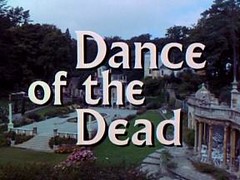 Prisoner: Dance of the Dead
Originally uploaded by Gordon D
Prisoner: Dance of the Dead
Originally uploaded by Gordon D Doctor: Every man has a breaking point! Number 2: I don't want him broken...he must be won over....this man has a future with us.
(Revised 01/03/2023)
If "Free For All" dealt with Capital-P-Politics in the Village, "Dance of the Dead" deals with small-p politics - the ways in which the Villagers, each of different ranks, handle each other. It's an episode in which a great deal of information is imparted, and there's about a season's worth of Lost information provided in a nice, 50-minute block...and cleverly, as well.
It's time for Carnival, where there is "music, dancing, happiness....by decree." Number 6 runs into another old friend (Roland Walter Dutton) and a dead body with a radio. We learn that Number 2 fully believes that Number 6 is a "special" case...and that he will not easily be broken. (In fact, Dutton serves as a good counter to Number 6 - at the end of this episode, it's easy to see how Number 6's character compares to Dutton's). There's also an excellent theme about the interpersonal games that are played (hence the "small p politics"). A very flirtatious maid makes her way into Number 6's life. When provided his own tuxedo, Number 6 provides an excellent semi-punch line to Number 2's comment, "He's an individual...and they're always trying."
Towards the end, Number 6's "trial" is a game in and of itself, more allegorical than the plot - three of the main characters in the episode, dressed as infamous tyrants, judge Number 6 of being guilty of the crime of having a radio in the Village, and he is officially declared "dead." (Meaning - he's not welcome, and he technically does not exist. It's hard to do a straightforward review of this episode since it works on multiple levels, but (in my opinion) the ultimate theme is announced by a lonely voice on the radio, as Number 6 finds himself in a far corner of the Village, attempting to gain radio signals to determine his location. The voice announces, "Only through pain can tomorrow be assured," which works on two levels - both on the level of the mandatory frivolity of Carnival and amidst the various games that are played (ending with a move that informs Number 6 - and the audience - that nothing really is as it seems). Its ultimate message is that, to paraphrase a quote, some games are worth playing despite being unable to win...
However, one aspect of this episode - which will have to be explored when watching further episodes - seems quite jarring. It happens towards the end, with a quote that simultaneously defies and defines the themes of individuality within The Prisoner.
Number 6: “Never trust a woman; even the four-legged variety.”
Granted, this may be part of Patrick McGoohan's slightly out-of-it sense of chivalry; on Danger Man, his character of John Drake had a tendency to use brains over fists. (Of course, McGoohan thinks fist fights are better than love scenes, so go figure). A statement like this - given that Number 6 is in a situation where his individuality is threatened, the secrets in his head are his highest commodity, and the greatest need for him to "follow along" - is jarring; his slogan should be to never trust anybody.

1 comment:
Nothing to add here but to say that I've been reading analyses of Prisoner episodes for thirty years now and have a stack of books about the show...and you still managed to come up with observations I've never seen before. Kudos, sir.
(And the link for the boxed set on Amazon lists Fenella Fielding as the star of the show? That's kind of weird...but again a new discovery, as I never realized that voice belonged to one of my favorites from the Carry On films...)
Post a Comment